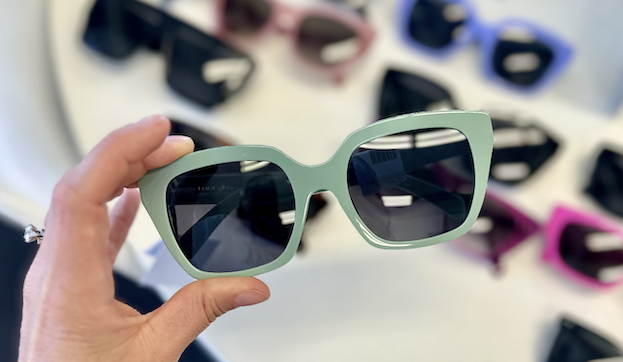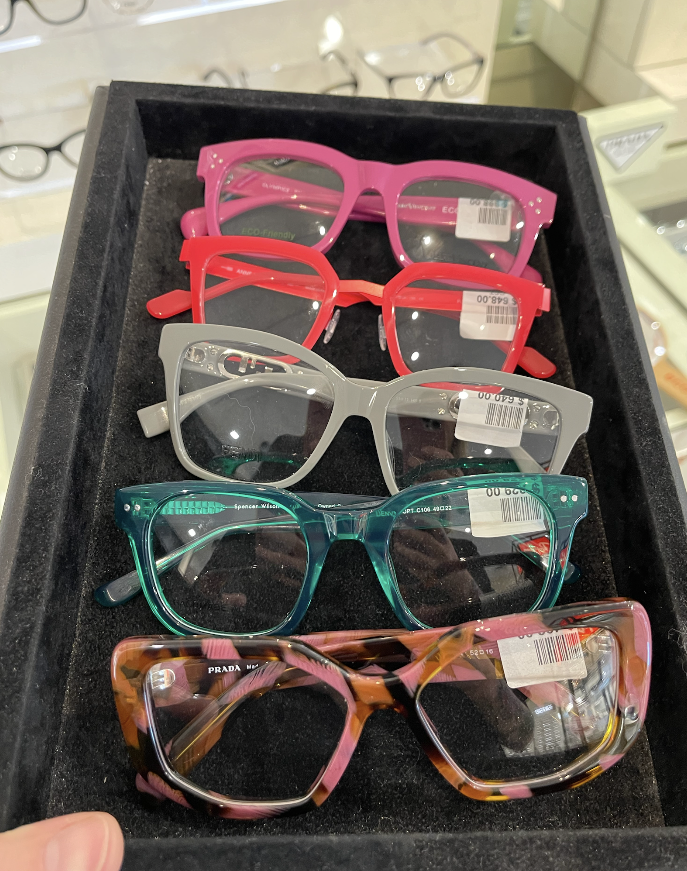Pollen’s in the air, and so are itchy eyes for one in three Australians battling hay fever.
When it comes to allergies, hay fever is the most common, affecting 10-30% of people all over the globe.
It might surprise you to learn that this pesky condition doesn’t just mess with your nose, it can also make your eyes throw a red and watery tantrum.
Eye Allergy Triggers
Hay fever, or allergic rhinitis, occurs when your body mistakenly treats harmless things like pollen, mold, dust, or pet fur as dangerous and becomes overly sensitive to them. These substances are known as allergens.
In response to these allergens, your body makes special fighters called immunoglobulin E antibodies to get rid of them.
The antibodies cause chemicals, like histamine, to be released in your bloodstream, which makes you sneeze, get a runny nose, or may cause your eyes to become itchy, red and watery.
Eye allergies can also be caused by reactions to certain cosmetics or eye drops, including lubricants used for treating dry eye that contain preservatives.
Food allergies and allergic reactions to bee stings or other insect bites do not usually affect eyes as severely as airborne allergens.
Happy Eyes Ahead: Tips to Beat Eye Allergies
Avoid allergens
To get relief from eye allergies and itchy, watery eyes, here’s what you can do:
- Stay away from things that make your eyes itch, like pollen, dust, and pet fur.
- Vacuum and dust your house often, keep your home clean and free from pollen.
- Keep windows closed and use high-quality filters to catch allergens. HEPA filters are great for improving air quality and reducing allergens in your home.
- Wash your bedding and curtains regularly, preferably in hot water.
- Stay indoors during high pollen seasons, and wear wrap-around sunglasses outside to protect your eyes.
- Keep your car windows closed to keep allergens out.
- Remember to avoid touching your eyes a lot, as this can spread allergens from your hands.
Contact-Free Allergy Relief
Ditching those lenses might be your ticket to allergy relief and keeping your eyes happy and healthy.
Contacts can act like little allergen traps, pulling all the pollen and dust right up close to your eyes. This can cause irritation, followed by stingy and burning eyes, and can make your allergies worse. In fact, 50% of contact lens wearers experience allergy symptoms due to this debris.
On top of that, contacts can make your eyes extremely dry and uncomfortable, with around 50-70% of contact lens wearers experiencing symptoms of dry eye.
Around 90% of contact lens users don’t follow optimal hygiene practices, which becomes the major reason for these allergies.
If you’re not ready to part with your contacts, make sure you treat them right by cleaning them with fresh solution and not wearing them longer than recommended.
Use lenses that you discard after a single use to avoid the build-up of allergens and other debris. Additionally, opt for solutions that are gentle on your eyes and help reduce allergens, keeping your eyes free from irritants.
Glasses are a great alternative because they keep your eyes protected and don’t touch them directly, so allergens can’t settle there. Cleaning your glasses is also quick and easy, helping to clear away pollen and dust.
Non-prescription Eye Drops
Battling itchy, watery eyes from allergies? Non-prescription eye drops are an easy fix.
By soothing your eyes and removing allergens like dust and pollen, they stop your allergies from acting up.
Some drops have antihistamines, which block the effects of what’s causing your allergy, while others just keep your eyes moist and comfortable.
If your symptoms aren’t too bad, these over-the-counter drops can be a great option that doesn’t cost a lot. They provide quick relief and are easy to use throughout the day.
For the best results, ask your Optometrist to recommend the best product for you.
Discuss Prescription Meds with Your Doctor
If your allergy symptoms are relatively severe, or over the counter eye drops do not provide relief, you may need your Optometrist to prescribe a stronger medication.
Prescription eye drops and oral medications used to relieve eye allergies can include:
-
Antihistamines
When you come into contact with pollen or dust, which makes you sneeze or itch, your immune system releases histamine as a natural warning alarm.
It’s your body’s way of reacting to stuff it doesn’t like. When histamine kicks in, it makes your blood vessels leak, causing your nose to run and your eyes to itch, all to get rid of the irritants.
Antihistamines act as a soothing helper that turns off the alarm. By interfering with histamine, antihistamines stop it from triggering those itchy and uncomfortable symptoms and making them worse.
They work fast and provide instant relief, so you can start feeling better in no time and stay comfortable for up to 24 hours.
Antihistamines come in different forms: eye drops for itchy eyes, nasal sprays for congestion, and tablets for full relief. They’re a practical and safe way to manage your allergies and keep your eyes feeling happy and healthy.
-
Decongestants
Decongestants come to the rescue by shrinking the swollen blood vessels on the white part of your eye called sclera, helping to relieve the redness and puffiness.
They also help to relieve nasal stuffiness by reducing swelling of the blood vessels, allowing you to breathe better and more comfortably.
Common decongestants include phenylephrine and pseudoephedrine. Some options combine both an antihistamine and a decongestant. The antihistamine handles the itching and redness in your eyes, while the decongestant takes care of your stuffy nose, giving you total relief from allergies.
-
Mast Cell Stabilizers
Have you thought about stopping your allergies before they start? That’s exactly what mast cell stabilizers do.
Mast cell stabilizers are like your body’s early defense system against allergies.
Instead of waiting for the itching and redness to start, they get ahead of the game by calming down the mast cells, which are the cells responsible for triggering those annoying allergy symptoms.
The catch? They don’t work instantly. It takes a couple of weeks for them to build up in your system, so they’re most effective when you start using them before allergy season kicks in.
Think of them as prevention, not a quick fix. If you’ve already got symptoms, they won’t be much help, but if you start early, they can really reduce how often you deal with allergy flare-ups.
-
Non-steroidal anti-inflammatory drugs (NSAIDs)
If allergies have left your eyes feeling itchy, red, and uncomfortable, NSAID eye drops could offer you the relief you’re looking for.
These drops are specially designed to ease the swelling and inflammation caused by allergens, so your eyes can feel more comfortable and clear.
By calming the irritation, NSAID eye drops help you get back to enjoying your day without constantly battling allergy symptoms.
-
Steroids
If you’re dealing with acute eye allergy symptoms and other treatments haven’t worked, these powerful medications act quickly to calm inflammation and ease irritation, providing fast relief.
While they’re excellent for short-term comfort, using corticosteroids for too long can come with some risks.
Prolonged use might increase eye pressure, which could lead to glaucoma, or even result in cataracts that affect your vision.
To help you get the relief you need while keeping your eye health in check, doctors usually recommend using corticosteroids for a short time.
Do Your Eyes Feel Allergic?
Take this quiz if you think you might have eye allergies. Always see an Optometrist if you suspect you have an eye condition needing care.
Do allergies run in your family? Yes No
Do your eyes often itch, particularly during spring pollen season? Yes No
Have you ever been diagnosed with conjunctivitis (“pink eye”)? Yes No
Are you allergic to certain animals, such as cats? Yes No
Do you often need antihistamines and/or decongestants to control sneezing, Yes No
coughing and congestion?
When pollen is in the air, are your eyes less red and itchy when you stay Yes No
indoors under an air conditioner?
Do your eyes begin tearing when you wear certain cosmetics or lotions, Yes No
or when you’re around certain strong perfumes?
If you answered “yes” to most of these questions, it’s an Eye Allergy Alert!
If you experience constant itchiness or watering, or notice symptoms worsening during certain times of the year, it’s important to consult your Optometrist.
At Eyes&Vision, our Optometrists are experts in diagnosing, managing, and treating a variety of vision problems, eye diseases, and ocular conditions.
Book an appointment with your Eyes&Vision Optometrist today to find the best treatment plan for lasting relief and healthier eyes.





















